China and Covid19
Viral Politics: Next-Stage Investigation Into Covid-19 Origins Discussed on Weibo
Many Weibo users agree with Chinese officials that the U.S. re-investigation of the Covid-19 origin is about “political manipulation” and “blame-shifting.”
Published
3 years agoon
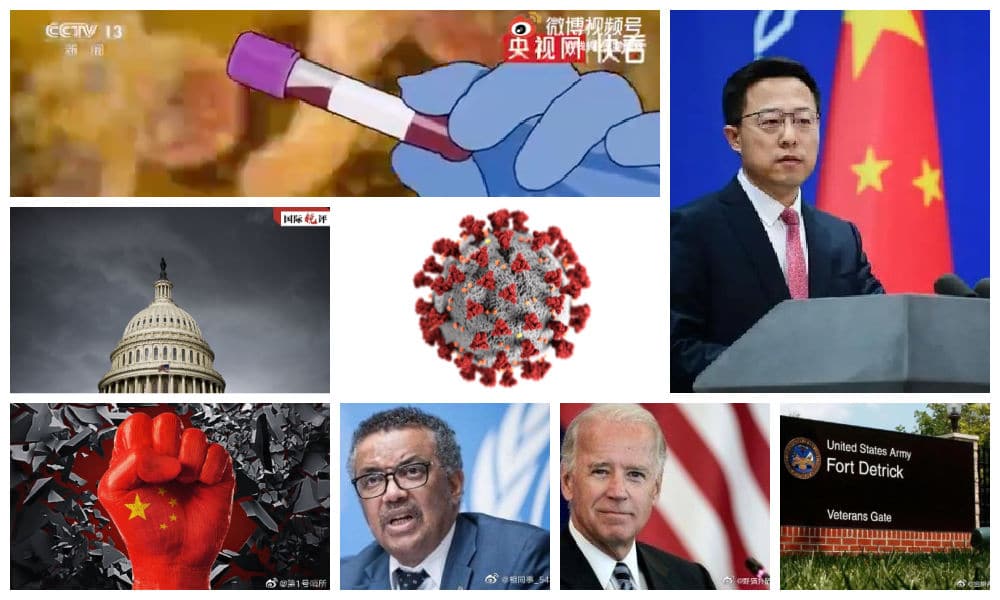
While President Biden ordered a closer review into the origins of the Covid-19 and more countries are calling for action on a next phase study, Chinese officials demand that the U.S. thoroughly investigates the source of the epidemic within America’s own borders and biological labs.
Fifteen months after the WHO declared the novel coronavirus (Covid-19) outbreak a global pandemic, the origin of the virus is still unclear. After the Wuhan field visit of the international WHO research team earlier in 2021, all hypotheses on the origin of the virus remain on the table.
As the efforts to get more people vaccinated continue and the outlook on containing Covid-19 are more positive, the question of where the virus that causes Covid-19 came from is attracting attention again. The issue of the ‘origin investigation problem’ (“溯源问题”) is also generating discussions on Chinese social media.
The U.S. Side: “Looking for a Definitive Conclusion”
On May 26, the White House released President Joe Biden’s statement calling for further investigation into the origins of Covid-19.
The statement says that there is still no definitive conclusion on the origins of the virus, with two scenarios being most likely: human contact with an infected animal or a laboratory accident. Biden writes that he has asked the Intelligence Community to “redouble their efforts to collect and analyze information that could bring us closer to a definitive conclusion,” asking for a follow-up within 90 days, with a special focus on China.
Speculation that the coronavirus may have emerged from a laboratory in Wuhan was first raised in early 2020, before being refuted and sidelined as a “conspiracy theory” by many scientists.
A statement in The Lancet published in February of 2020 condemned any rumors on the virus origins, claiming that scientific research “overwhelmingly” concludes that the new coronavirus originated in wildlife. The WHO research team investigating the origins of Covid-19 also called it “extremely unlikely” that the virus leaked from a lab in China.
The American Dr. Anthony Fauci, the director of the National Institute of Allergy and Infectious Diseases, was among those scientists who originally refuted the ‘lab leak’ theory. But in May of 2021, Fauci said he was “no longer convinced” that the Covid-19 pandemic originated naturally.
In American media, reports on the ‘lab leak theory’ have also seen shifting narratives, going from a ‘conspiracy theory’ to a seemingly credible one. Last month, a Wall Street Journal published an opinion article titled ‘The Science Suggests a Wuhan Lab Leak,’ which claims that the pathogen of the novel coronavirus has a genetic footprint that has never been observed in a natural coronavirus.
The Wall Street Journal also reported on a study by the Lawrence Livermore National Laboratory in California, which concluded that the hypothesis of a virus leak from a Chinese lab in Wuhan is plausible and deserves further investigation. The report by Wall Street Journal included an alleged American State Department’s assertion that the U.S. government has reason to believe that several researchers inside the Wuhan Institute of Virology became sick in autumn 2019, “with symptoms that were consistent with Covid-19 or a seasonal flu.”
The Chinese Side: “It’s All about Blame-Shifting”
Chinese officials have repeatedly denied a possible leak from a Chinese laboratory and have emphasized their cooperation with international efforts to find the origins of the pandemic.
On May 27 of this year, a day after Biden’s statement was released, Zhao Lijian (赵立坚), spokesperson for the Foreign Ministry, responded to the reinvestigation of China regarding the origins of the novel coronavirus.
Zhao argued that the US is not actually interested in the scientific origin of the virus, but that its determination to reinvestigate China despite previous scientific conclusions is all about “political manipulation” and “blame-shifting.” He further said that the US – with over 33 million confirmed Covid-19 cases and 600,000 deaths from Covid-19 – should examine its own behavior, instead of “attempting to scapegoat China.”
Although China was the first country to report Covid-19 infections, the official stance has been that this does not necessarily mean that the new coronavirus “patient zero” was also in China.
Prior to the Wuhan lab leak theory, China had been questioning the US military base Fort Detrick in Fredrick, Maryland, about the leak of Covid-19 as an agent of biochemical warfare. In May of last year, China’s Foreign Ministry Spokesperson Hua Chunying asked for an international review of Fort Detrick and other bio-labs.
The #US keeps calling for transparency & investigation. Why not open up Fort Detrick & other bio-labs for international review? Why not invite #WHO & int’l experts to the US to look into #COVID19 source & response?
— Hua Chunying 华春莹 (@SpokespersonCHN) May 8, 2020
In light of recent developments, Chinese Foreign Ministry spokesperson Wang Wenbin (汪文斌) also, again, suggested that the U.S. should invite an international team of scientists to conduct an independent investigation on Fort Detrick on its potential link to the origin of Covid-19.
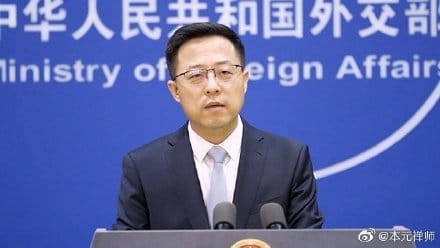
Chinese Ministry of Foreign Affairs spokesperson Zhao Lijian during the press conference.
This stance was again reiterated by Zhao Lijian in a June 17 press conference, where the MFA spokesperson asked the U.S. to explain why, being the most medically country in the world, their COVID19 death toll was so high and why nobody would take responsibility for this and give more transparency on Fort Detrick.
On June 22, China’s Ministry of Foreign Affairs turned the tables on the U.S. and demanded a thorough investigation of (1) the source of the epidemic in the United States, a (2) thorough investigation of the why’s and who’s of the American inadequate response in fighting the epidemic, and then also (3) an investigation into the safety concerns at Fort Detrick other biological labs (#赵立坚请美国赶紧回答3个问题#).
Weibo Discussions and Hashtags
On Chinese social media, various discussions and hashtags have come up in response to the recent developments regarding the research into the COVID19 origins. Most commenters agree on one thing, namely that the next stage of Covid-19 origin investigations is seemingly more about politics than about the virus itself.
A hashtag titled “Biden Ordered US Intelligence to Investigate the Origins of Covid-19” (#拜登令美情报部门调查新冠病毒起源) appeared on the same day as the White House statement was released and immediately attracted over 35 million views. Another relating hashtag on Weibo is “U.S. Specialists Have Changed Their Tune Regarding COVID19 Origin” (#美国专家在新冠病毒的来源上改口了#).
On Weibo, the most common reaction to Biden’s investigation and American media coverage of the origins of the virus is one of suspicion towards their true intentions, ranging from intense emotions to sarcastic humor. Weibo users suggest that Biden’s call to action is a politically charged move to further blame China for the pandemic amidst growing China-US tensions. Most netizens commenting under this hashtag feel that the U.S. is deliberately hyping the issue to discredit China, turning the COVID19 origins issue into a geopolitical issue, rather than a scientific one.
One popular comment (@乐隐灯清) said: “If I say you have it, then you have it – [this is] the second season of ‘Laundry Detergent’!” This sarcastic comment refers to the famous UN meeting where US Secretary of State Colin Powell presented a vial containing white powder, supposedly proving that Saddam Hussein was stockpiling anthrax, in order to justify the US’s invasion of Iraq. Putin fired back by calling this vial of powder “laundry detergent.”
There are also web users who are concerned with the 90-day limit of Biden’s announced investigation, questioning whether such a relatively short time would be enough for a thorough and fair study. One user, whose profile image is the Chinese national flag, wrote: “90 days? If you investigated Fort Detrick starting in the morning, you would already have the conclusion before lunchtime!”
One user questioned the US President’s move to trace Covid-19’s origin in China instead of in his own country: “Are they giving 90 days to investigate the origin or 90 days to fabricate a rumor?”
Another hashtag is “Where did the new coronavirus originate?” (#新冠肺炎病毒起源于哪里#). On this hashtag page, most discussions revolve around the fact that COVID19 was already found in various countries outside of China during or just before the early days of the Wuhan outbreak. Various studies suggest that the coronavirus might have been circulating in the US and France a month before it was officially confirmed.
“The fact that Chinese scientists were the first to discover the genetic sequence of the new coronavirus does not mean that Wuhan is the source of Covid-19, and it certainly cannot be used as a pretext to conclude that the virus was made by Chinese scientists,” one Weibo blogger (@侠骨一点情) wrote.
There are those who believe it is probable that the virus did come from the U.S., saying that the American investigation into China is an issue of “zéi hǎn zhuō zéi” (贼喊捉贼), an idiom that literally means ‘a thief crying “Stop Thief!”,’ conveying the idea that it is easy for someone to accuse another in order to cover up one’s own misdeeds.

‘Investigate Thoroughly! Except Here’ (‘彻查!除了这儿’) by 半桶老阿汤 / Half Can of Old Soup
In response to the investigation, the computer graphics artist @半桶老阿汤 / ‘Half Can of Old Soup’ also released a cartoon, showing President Biden blocking the entrance to Fort Detrick, with a WHO research team standing in front of the entrance.
Many web users support the Chinese official reaction that it is time for America to investigate the epidemic within its own borders. “First, discrediting and framing China regarding the virus origin has become a ‘national policy’ of the U.S. government to get rid of their [own] predicaments,” Chinese economist Tao Yongyi (@陶永谊) wrote on Weibo: “Now, the best defense is a good offense.”
By Susanna Sun & Manya Koetse
Follow @whatsonweibo
Spotted a mistake or want to add something? Please let us know in comments below or email us.
©2021 Whatsonweibo. All rights reserved. Do not reproduce our content without permission – you can contact us at info@whatsonweibo.com.
Stories that are authored by the What's on Weibo Team are the stories that multiple authors contributed to. Please check the names at the end of the articles to see who the authors are.

Also Read
China and Covid19
Sick Kids, Worried Parents, Overcrowded Hospitals: China’s Peak Flu Season on the Way
“Besides Mycoplasma infections, cases include influenza, Covid-19, Norovirus, and Adenovirus. Heading straight to the hospital could mean entering a cesspool of viruses.”
Published
8 months agoon
November 22, 2023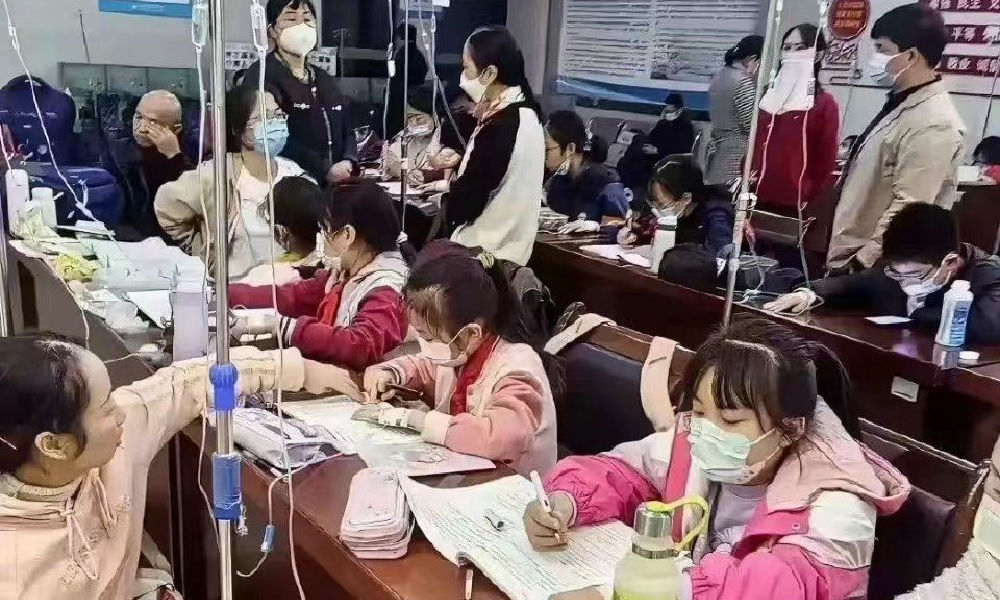
In the early morning of November 21, parents are already queuing up at Xi’an Children’s Hospital with their sons and daughters. It’s not even the line for a doctor’s appointment, but rather for the removal of IV needles.
The scene was captured in a recent video, only one among many videos and images that have been making their rounds on Chinese social media these days (#凌晨的儿童医院拔针也要排队#).
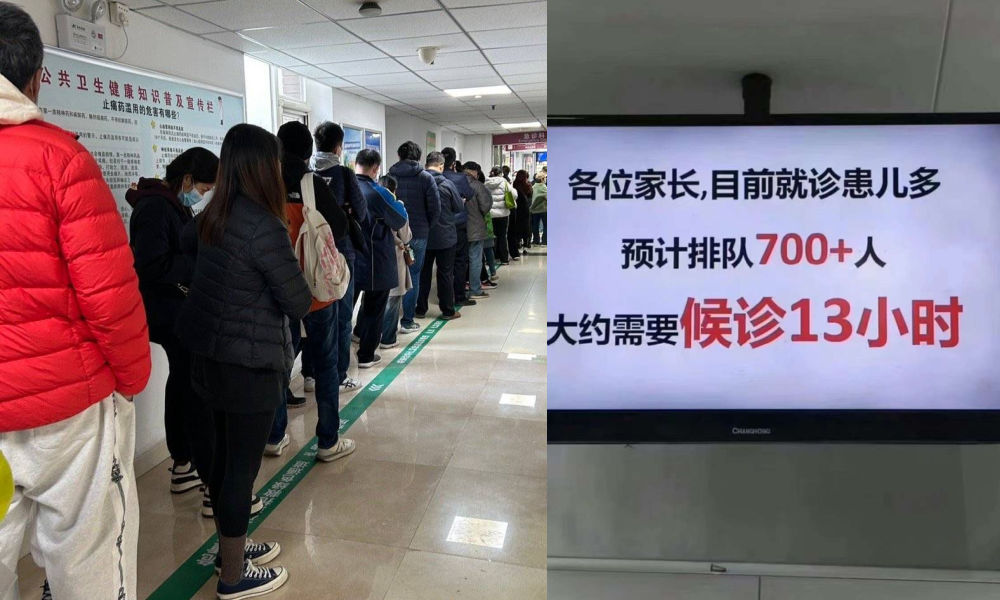
One photo shows a bulletin board at a local hospital warning parents that over 700 patients are waiting in line, estimating a waiting time of more than 13 hours to see a doctor.
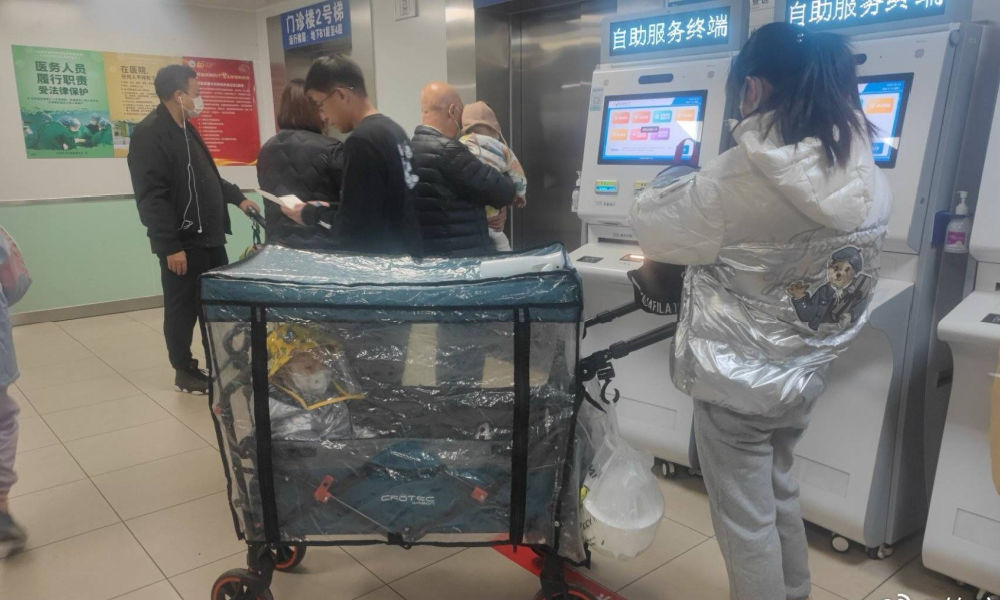
Another image shows children doing their homework while hooked up on an IV.

Recent discussions on Chinese social media platforms have highlighted a notable surge in flu cases. The ongoing flu season is particularly impacting children, with multiple viruses concurrently circulating and contributing to a high incidence of respiratory infections.
Among the prevalent respiratory infections affecting children are Mycoplasma pneumoniae infections, influenza, and Adenovirus infection.
The spike in flu cases has resulted in overcrowded children’s hospitals in Beijing and other Chinese cities. Parents sometimes have to wait in line for hours to get an appointment or pick up medication.
According to one reporter at Haibao News (海报新闻), there were so many patients at the Children’s Hospital of Capital Institute of Pediatrics (首都儿科研究所) on November 21st that the outpatient desk stopped accepting new patients by the afternoon. Meanwhile, 628 people were waiting in line to see a doctor at the emergency department.
Reflecting on the past few years, the current flu season marks China’s first ‘normal’ flu peak season since the outbreak of Covid-19 in late 2019 / early 2020 and the end of its stringent zero-Covid policies in December 2022. Compared to many other countries, wearing masks was also commonplace for much longer following the relaxation of Covid policies.
Hu Xijin, the well-known political commentator, noted on Weibo that this year’s flu season seems to be far worse than that of the years before. He also shared that his own granddaughter was suffering from a 40 degrees fever.
“We’re all running a fever in our home. But I didn’t dare to go to the hospital today, although I want my child to go to the hospital tomorrow. I heard waiting times are up to five hours now,” one Weibo user wrote.
“Half of the kids in my child’s class are sick now. The hospital is overflowing with people,” another person commented.
One mother described how her 7-year-old child had been running a fever for eight days already. Seeking medical attention on the first day, the initial diagnosis was a cold. As the fever persisted, daily visits to the hospital ensued, involving multiple hours for IV fluid administration.
While this account stems from a single Weibo post within a fever-advice community, it highlights a broader trend: many parents swiftly resort to hospital visits at the first signs of flu or fever. Several factors contribute to this, including a lack of General Practitioners in China, making hospitals the primary choice for medical consultations also in non-urgent cases.
There is also a strong belief in the efficacy of IV infusion therapy, whether fluid-based or containing medication, as the quickest path to recovery. Multiple factors contribute to the widespread and sometimes irrational use of IV infusions in China. Some clinics are profit-driven and see IV infusions as a way to make more money. Widespread expectations among Chinese patients that IV infusions will make them feel better also play a role, along with some physicians’ lacking knowledge of IV therapy or their uncertainty to distinguish bacterial from viral infections (read more here)
To prevent an overwhelming influx of patients to hospitals, Chinese state media, citing specialists, advise parents to seek medical attention at the hospital only for sick infants under three months old displaying clear signs of fever (with or without cough). For older children, it is recommended to consult a doctor if a high fever persists for 3 to 5 days or if there is a deterioration in respiratory symptoms. Children dealing with fever and (mild) respiratory symptoms can otherwise recover at home.
One Weibo blogger (@奶霸知道) warned parents that taking their child straight to the hospital on the first day of them getting sick could actually be a bad idea. They write:
“(..) pediatric departments are already packed with patients, and it’s not just Mycoplasma infections anymore. Cases include influenza, Covid-19, Norovirus, and Adenovirus. And then, of course, those with bad luck are cross-infected with multiple viruses at the same time, leading to endless cycles. Therefore, if your child experiences mild coughing or a slight fever, consider observing at home first. Heading straight to the hospital could mean entering a cesspool of viruses.”
The hashtag for “fever” saw over 350 million clicks on Weibo within one day on November 22.
Meanwhile, there are also other ongoing discussions on Weibo surrounding the current flu season. One topic revolves around whether children should continue doing their homework while receiving IV fluids in the hospital. Some hospitals have designated special desks and study areas for children.
Although some commenters commend the hospitals for being so considerate, others also remind the parents not to pressure their kids too much and to let them rest when they are not feeling well.
Opinions vary: although some on Chinese social media say it's very thoughtful for hospitals to set up areas where kids can study and read, others blame parents for pressuring their kids to do homework at the hospital instead of resting when not feeling well. pic.twitter.com/gnQD9tFW2c
— Manya Koetse (@manyapan) November 22, 2023
By Manya Koetse, with contributions from Miranda Barnes
Get the story behind the hashtag. Subscribe to What’s on Weibo here to receive our newsletter and get access to our latest articles:
Spotted a mistake or want to add something? Please let us know in comments below or email us. First-time commenters, please be patient – we will have to manually approve your comment before it appears.
©2023 Whatsonweibo. All rights reserved. Do not reproduce our content without permission – you can contact us at info@whatsonweibo.com.
China and Covid19
Repurposing China’s Abandoned Nucleic Acid Booths: 10 Innovative Transformations
Abandoned nucleic acid booths are getting a second life through these new initiatives.
Published
1 year agoon
May 19, 2023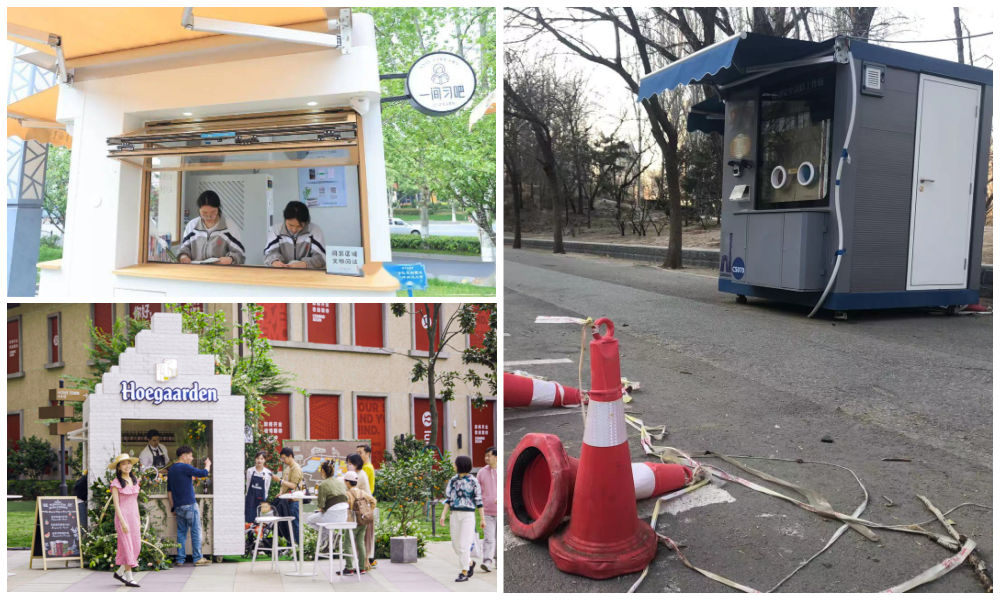
During the pandemic, nucleic acid testing booths in Chinese cities were primarily focused on maintaining physical distance. Now, empty booths are being repurposed to bring people together, serving as new spaces to serve the community and promote social engagement.
Just months ago, nucleic acid testing booths were the most lively spots of some Chinese cities. During the 2022 Shanghai summer, for example, there were massive queues in front of the city’s nucleic acid booths, as people needed a negative PCR test no older than 72 hours for accessing public transport, going to work, or visiting markets and malls.
The word ‘hésuān tíng‘ (核酸亭), nucleic acid booth (also:核酸采样小屋), became a part of China’s pandemic lexicon, just like hésuān dìtú (核酸地图), the nucleic acid test map lauched in May 2022 that would show where you can get a nucleic test.
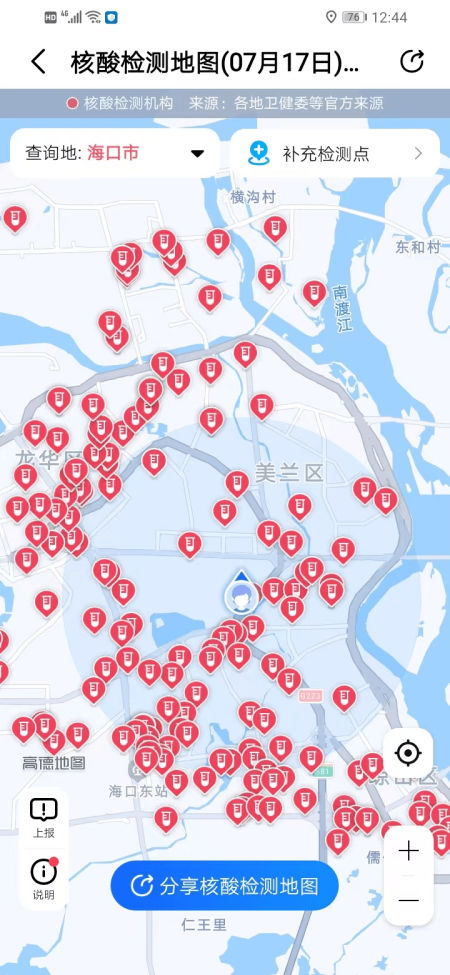
Example of nucleic acid test map.
During Halloween parties in Shanghai in 2022, some people even came dressed up as nucleic test booths – although local authorities could not appreciate the creative costume.
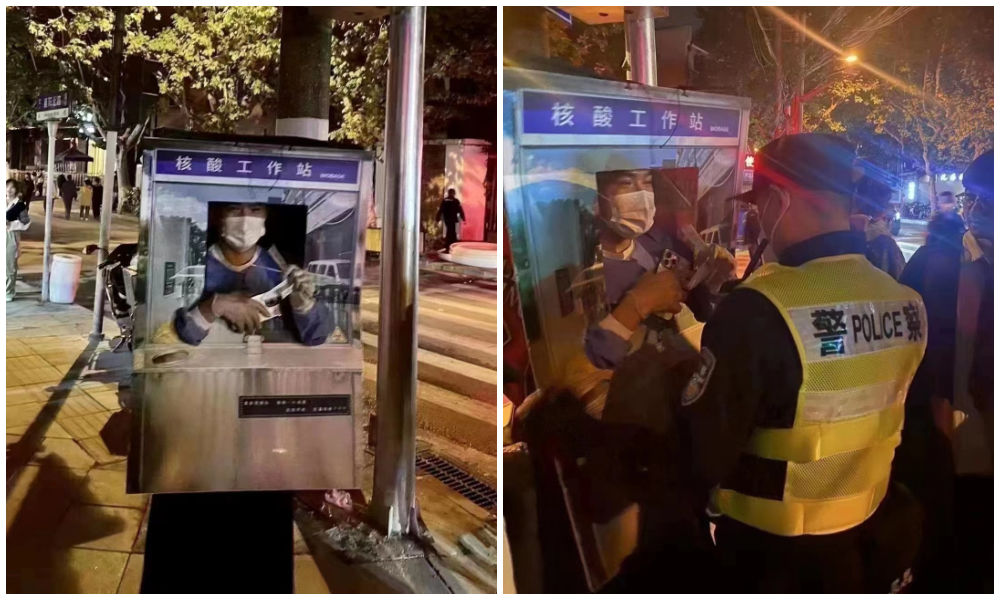
Halloween 2022: dressed up as nucliec acid booths. Via @manyapan twitter.
In December 2022, along with the announced changed rules in China’s ‘zero Covid’ approach, nucleic acid booths were suddenly left dismantled and empty.
With many cities spending millions to set up these booths in central locations, the question soon arose: what should they do with the abandoned booths?
This question also relates to who actually owns them, since the ownership is mixed. Some booths were purchased by authorities, others were bought by companies, and there are also local communities owning their own testing booths. Depending on the contracts and legal implications, not all booths are able to get a new function or be removed yet (Worker’s Daily).
In Tianjin, a total of 266 nucleic acid booths located in Jinghai District were listed for public acquisition earlier this month, and they were acquired for 4.78 million yuan (US$683.300) by a local food and beverage company which will transform the booths into convenience service points, selling snacks or providing other services.
Tianjin is not the only city where old nucleic acid testing booths are being repurposed. While some booths have been discarded, some companies and/or local governments – in cooperation with local communities – have demonstrated creativity by transforming the booths into new landmarks. Since the start of 2023, different cities and districts across China have already begun to repurpose testing booths. Here, we will explore ten different way in which China’s abandoned nucleic test booths get a second chance at a meaningful existence.
1: Pharmacy/Medical Booths
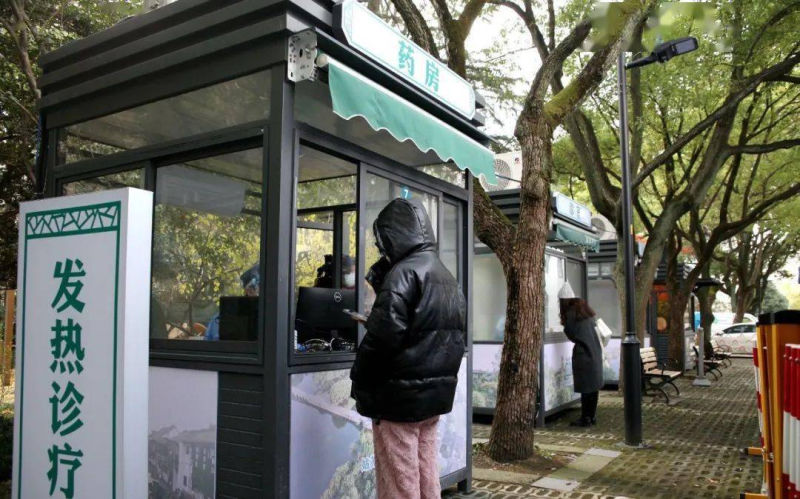
Via ‘copyquan’ republished on Sohu.
Blogger ‘copyquan’ recently explored various ways in which abandoned PCR testing points are being repurposed.
One way in which they are used is as small pharmacies or as medical service points for local residents (居民医疗点). Alleviating the strain on hospitals and pharmacies, this was one of the earliest ways in which the booths were repurposed back in December of 2022 and January of 2023.
Chongqing, Tianjin, and Suzhou were among earlier cities where some testing booths were transformed into convenient medical facilities.
2: Market Stalls
In Suzhou, Jiangsu province, the local government transformed vacant nucleic acid booths into market stalls for the Spring Festival in January 2022, offering them free of charge to businesses to sell local products, snacks, and traditional New Year goods.
The idea was not just meant as a way for small businesses to conveniently sell to local residents, it was also meant as a way to attract more shoppers and promote other businesses in the neighborhood.
3: Community Service Center

Small grid community center in Shizhuang Village, image via Sohu.
Some residential areas have transformed their local nucleic acid testing booths into community service centers, offering all kinds of convenient services to neighborhood residents.
These little station are called wǎnggé yìzhàn (网格驿站) or “grid service stations,” and they can serve as small community centers where residents can get various kinds of care and support.
4: “Refuel” Stations
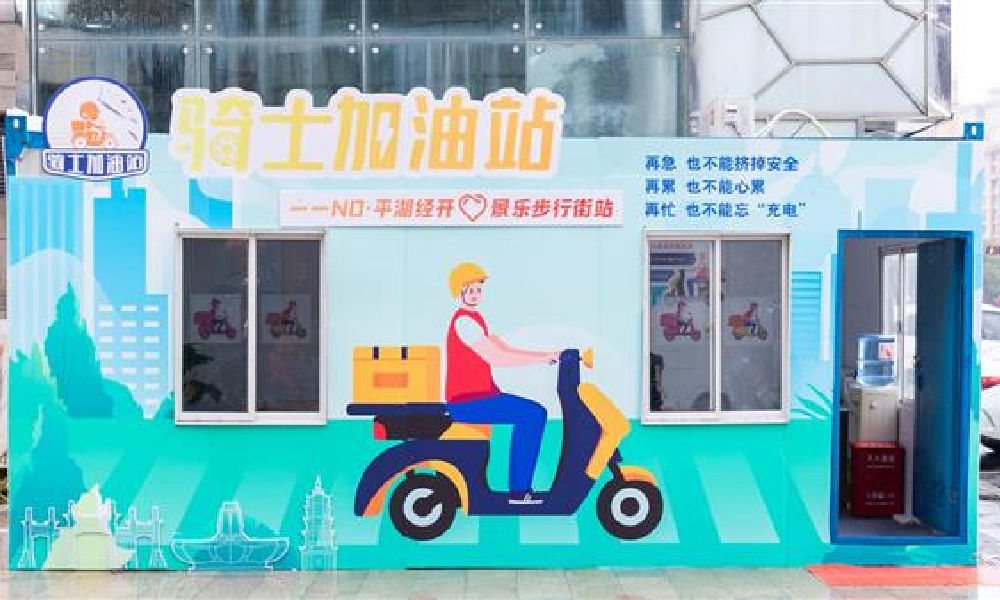
In February of this year, 100 idle nucleic acid sampling booths were transformed into so-called “Rider Refuel Stations” (骑士加油站) in Zhejiang’s Pinghu. Although it initially sounds like a place where delivery riders can fill up their fuel tanks, it is actually meant as a place where they themselves can recharge.
Delivery riders and other outdoor workers can come to the ‘refuel’ station to drink some water or tea, warm their hands, warm up some food and take a quick nap.
5: Free Libraries
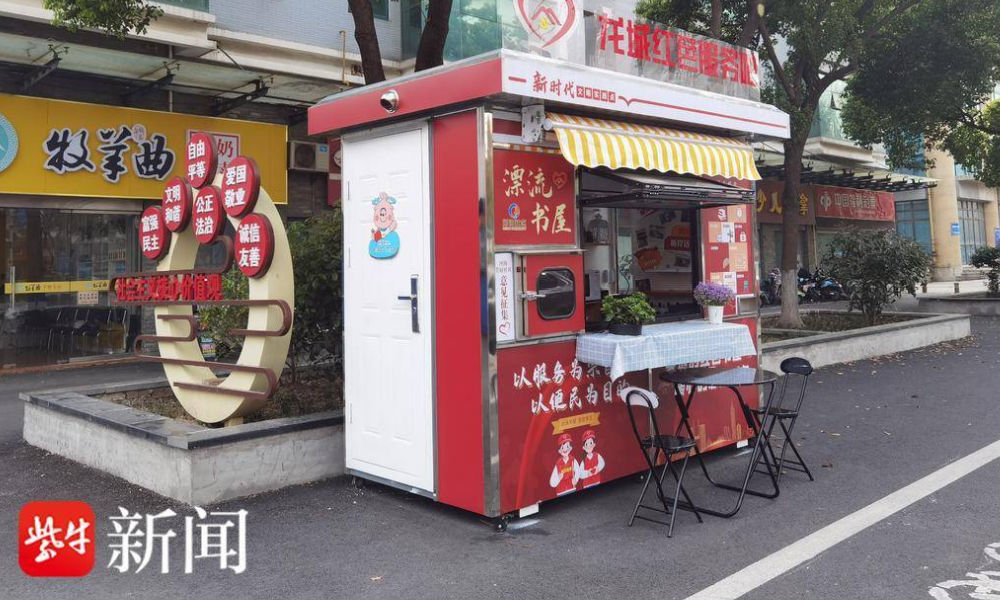
image via sohu.
In various Chinese cities, abandoned nucleic acid booths have been transformed into little free libraries where people can grab some books to read, donate or return other books, and sit down for some reading.
Changzhou is one of the places where you’ll find such “drifting bookstores” (漂流书屋) (see video), but similar initiatives have also been launched in other places, including Suzhou.
6: Study Space
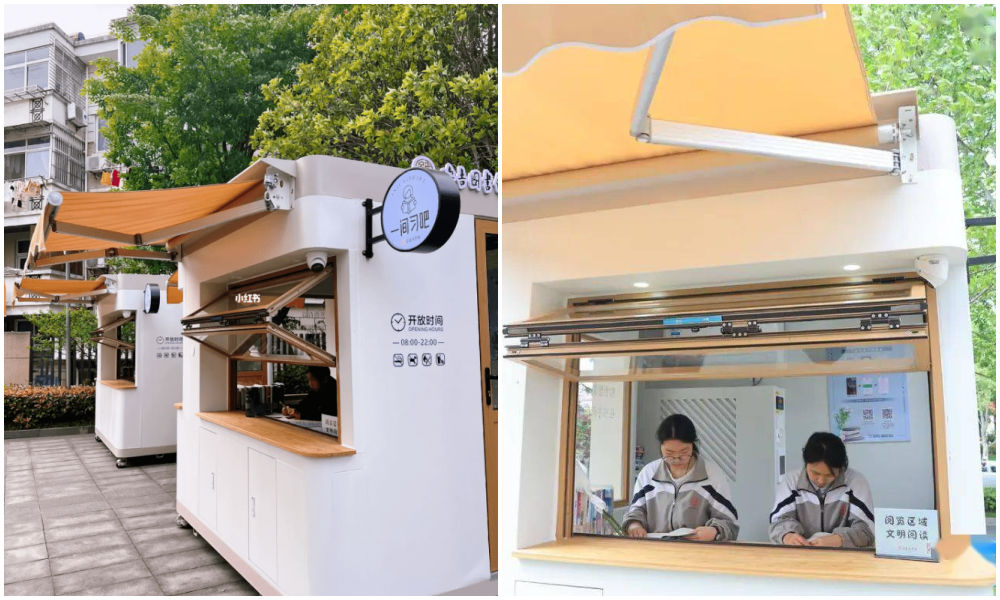
Photos via Copyquan’s article on Sohu.
Another innovative way in which old testing points are being repurposed is by turning them into places where students can sit together to study. The so-called “Let’s Study Space” (一间习吧), fully airconditioned, are opened from 8 in the morning until 22:00 at night.
Students – or any citizens who would like a nice place to study – can make online reservations with their ID cards and scan a QR code to enter the study rooms.
There are currently ten study booths in Anji, and the popular project is an initiative by the Anji County Library in Zhejiang (see video).
7: Beer Kiosk

Hoegaarden beer shop, image via Creative Adquan.
Changing an old nucleic acid testing booth into a beer bar is a marketing initiative by the Shanghai McCann ad agency for the Belgium beer brand Hoegaarden.
The idea behind the bar is to celebrate a new spring after the pandemic. The ad agency has revamped a total of six formr nucleic acid booths into small Hoegaarden ‘beer gardens.’
8: Police Box
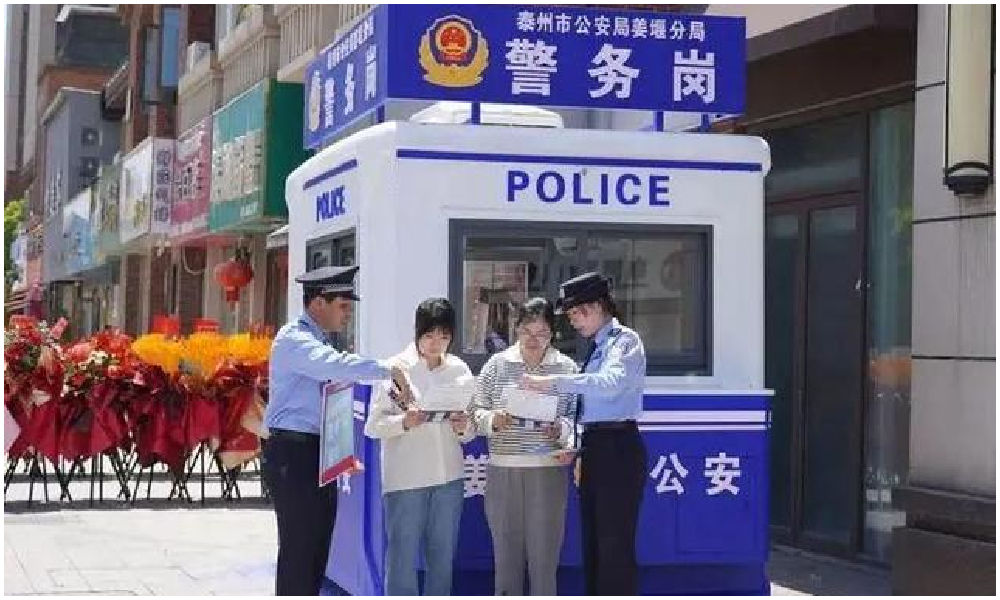
In Taizhou City, Jiangsu Province, authorities have repurposed old testing booths and transformed them into ‘police boxes’ (警务岗亭) to enhance security and improve the visibility of city police among the public.
Currently, a total of eight vacant nucleic acid booths have been renovated into modern police stations, serving as key points for police presence and interaction with the community.
9: Lottery Ticket Booths
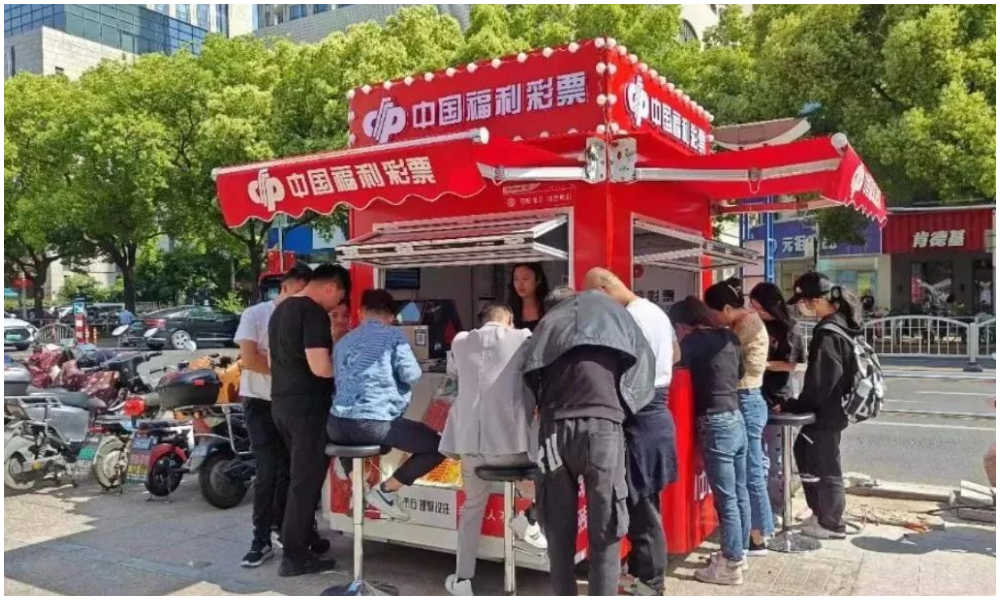
Image via The Paper
Some nucleic acid booths have now been turned into small shops selling lottery tickets for the China Welfare Lottery. One such place turning the kiosks into lottery shops is Songjiang in Shanghai.
Using the booths like this is a win-win situation: they are placed in central locations so it is more convenient for locals to get their lottery tickets, and on the other hand, the sales also help the community, as the profits are used for welfare projects, including care for the elderly.
10: Mini Fire Stations
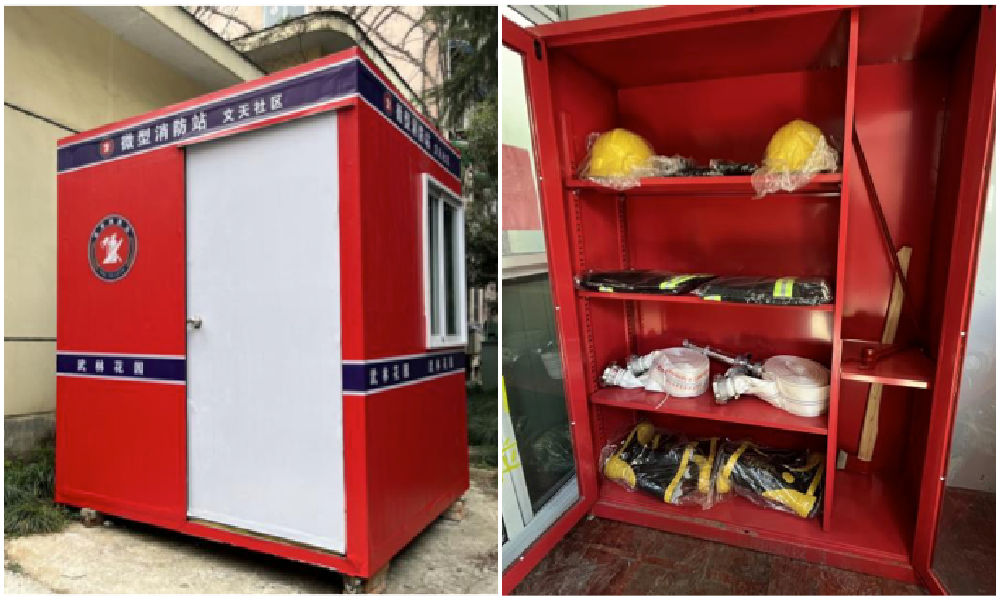
Micro fire stations, images via ZjNews.
Some communities decided that it would be useful to repurpose the testing points and turn them into mini fire kiosks, just allowing enough space for the necessary equipment to quickly respond to fire emergencies.
Want to read more about the end of ‘zero Covid’ in China? Check our other articles here.
By Manya Koetse,
Get the story behind the hashtag. Subscribe to What’s on Weibo here to receive our newsletter and get access to our latest articles:
Spotted a mistake or want to add something? Please let us know in comments below or email us. First-time commenters, please be patient – we will have to manually approve your comment before it appears.
©2023 Whatsonweibo. All rights reserved. Do not reproduce our content without permission – you can contact us at info@whatsonweibo.com.
Subscribe

Weibo Watch: The Future is Here

“Bye Bye Biden”: Biden’s Many Nicknames in Chinese

Enjoying the ‘Sea’ in Beijing’s Ditan Park

A Triumph for “Comrade Trump”: Chinese Social Media Reactions to Trump Rally Shooting

Weibo Watch: Get Up, Stand Up

The Tragic Story of “Fat Cat”: How a Chinese Gamer’s Suicide Went Viral

“Old Bull Eating Young Grass”: 86-Year-Old Chinese Painter Fan Zeng Marries 36-Year-Old Xu Meng

A Brew of Controversy: Lu Xun and LELECHA’s ‘Smoky’ Oolong Tea

Singing Competition or Patriotic Fight? Hunan TV’s ‘Singer 2024’ Stirs Nationalistic Sentiments

Zara Dress Goes Viral in China for Resemblance to Haidilao Apron

Weibo Watch: The Battle for the Bottom Bed

About the “AI Chatbot Based on Xi Jinping” Story

China’s Intensified Social Media Propaganda: “Taiwan Must Return to Motherland”

Weibo Watch: Telling China’s Stories Wrong

Saying Goodbye to “Uncle Wang”: Wang Wenbin Becomes Chinese Ambassador to Cambodia
Get in touch
Would you like to become a contributor, or do you have any tips or suggestions? Get in touch here!
Popular Reads
-

 China Insight3 months ago
China Insight3 months agoThe Tragic Story of “Fat Cat”: How a Chinese Gamer’s Suicide Went Viral
-

 China Music4 months ago
China Music4 months agoThe Chinese Viral TikTok Song Explained (No, It’s Not About Samsung)
-

 China Digital10 months ago
China Digital10 months agoToo Sexy for Weibo? Online Discussions on the Concept of ‘Cābiān’
-

 China Arts & Entertainment12 months ago
China Arts & Entertainment12 months agoBehind 8 Billion Streams: Who is Dao Lang Cursing in the Chinese Hit Song ‘Luocha Kingdom’?





